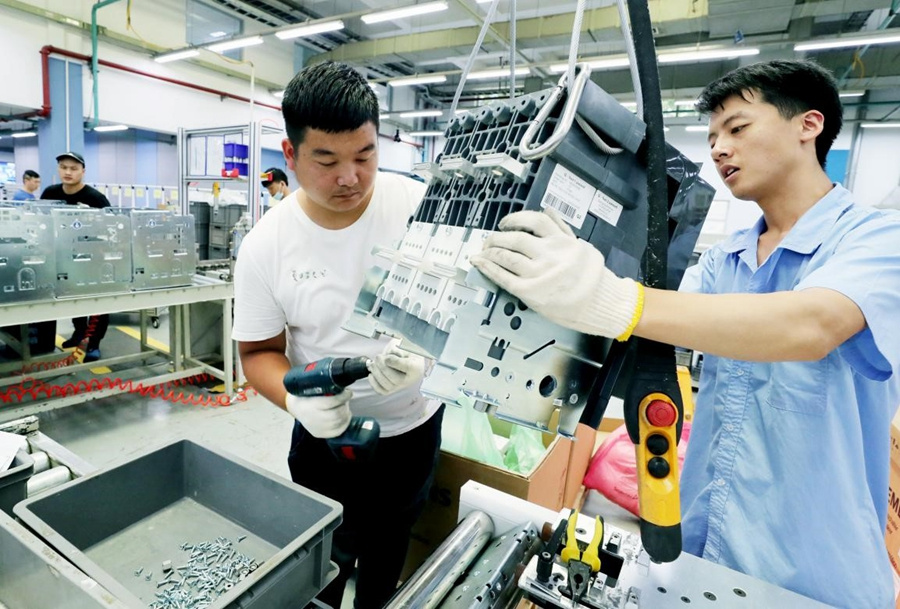China to quicken formulation and introduction of 2021 version of negative list for foreign investment: MOFCOM official

Workers at Siemens Electrical Apparatus Ltd., Suzhou, in east China's Jiangsu province, make products to be exported, June 22, 2021. [People's Daily Online/Hua Xuegen]
China will pick up pace in formulating and introducing the 2021 version of negative list for foreign investment and continuously expand its opening-up, in a bid to facilitate high-quality development through higher-level opening-up, said an official with the Ministry of Commerce of China (MOFCOM) at a press conference held by the State Council Information Office on August 23.
China has opened more fields up and further widened market access for foreign enterprises in recent years, said Wang Wentao, Minister of Commerce in China.
The country has not only cut the items on its national negative list for foreign investment to 33 from 93 in the 2015 version of the national negative list, but raised foreign equity caps in industries including automobile, finance and securities, Wang noted.
China's efforts to open its market wider have paid off. Since 2012, the overall scale of the country's foreign investment inflow has maintained growth. For nearly four years, China has remained the world's second largest recipient of foreign investment.
Last year, foreign direct investment (FDI) into China rose 4.5 percent while the global FDI flows fell by 40 percent. Despite the impact of the COVID-19 pandemic, 56 percent of U.S. companies, 73 percent of European companies, and 89 percent of Japanese companies in China still made profits last year, according to reports released by foreign chambers of commerce in China.
Most foreign companies in China are also participants in the country's construction of "dual circulation" development pattern whereby domestic and foreign markets can boost each other, with the domestic market as the mainstay, noted Wang.
Foreign-funded enterprises operate in China and benefit China, Wang said, explaining that on the one hand, with their production, sale and purchase activities all conducted in China, foreign enterprises have become deeply integrated into China's internal circulation; on the other hand, they have completed two fifths of China's imports and exports, thus facilitating the interaction between the country's domestic market and global markets.
The MOFCOM plans to roll out measures in four aspects to draw foreign investment, according to Wang.
For starters, the MOFCOM will continue shortening the country's negative list and widening market access for foreign investment, continuously easing restrictions and expanding opening-up. Meanwhile, the country will advance negotiations on free-trade agreements and actively participate in and promote WTO reform.
Second, the MOFCOM will further improve services for foreign companies. The ministry, together with 20 other government departments and major provinces in China, has established a task force for key foreign-invested projects, which has performed its function of solving problems for key foreign-invested companies and projects and will provide even better services in the future.
Third, the MOFCOM will give full play to the role of complaint mechanism to safeguard the rights and interests of foreign-funded enterprises in accordance with the law. The Investment Promotion Agency of the MOFCOM has set up the National Center for Complaints of Foreign-invested Enterprises. Regional foreign company complaint handling organs can also be found on the website of the MOFCOM.
Fourth, China will push ahead with the implementation of the foreign investment law and its supporting rules and regulations to create a world-class business environment established on market principles and the rule of law.
Pilot free trade zones, as China's new platform of opening-up and test fields of the country's reform and opening-up, have launched 278 institutional innovations at the national level. The construction of the country's Hainan Free Trade Port is also progressing steadily.
China intends to follow international economic and trade rules of higher standards to expand opening-up, such as rules of the Regional Comprehensive Economic Partnership agreement, said Wang.
"We will also further shorten the negative lists for foreign investment in pilot free trade zones, for which we have always been working hard," Wang said.
























